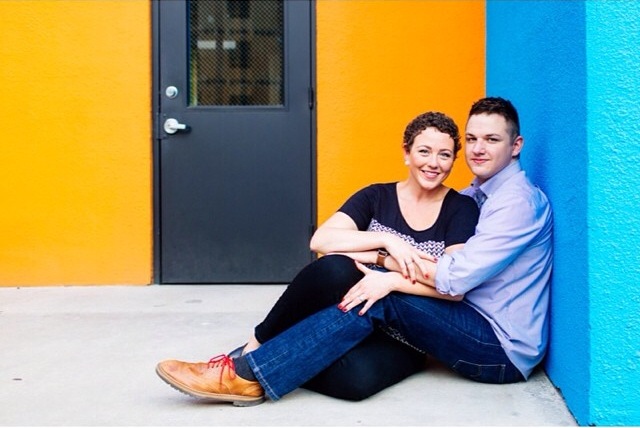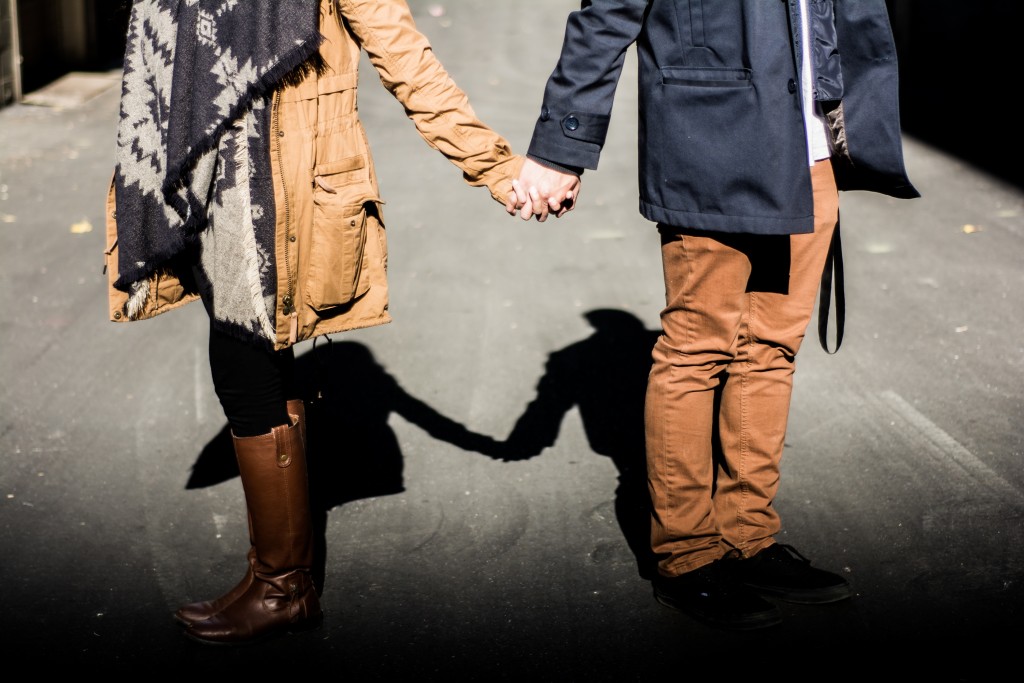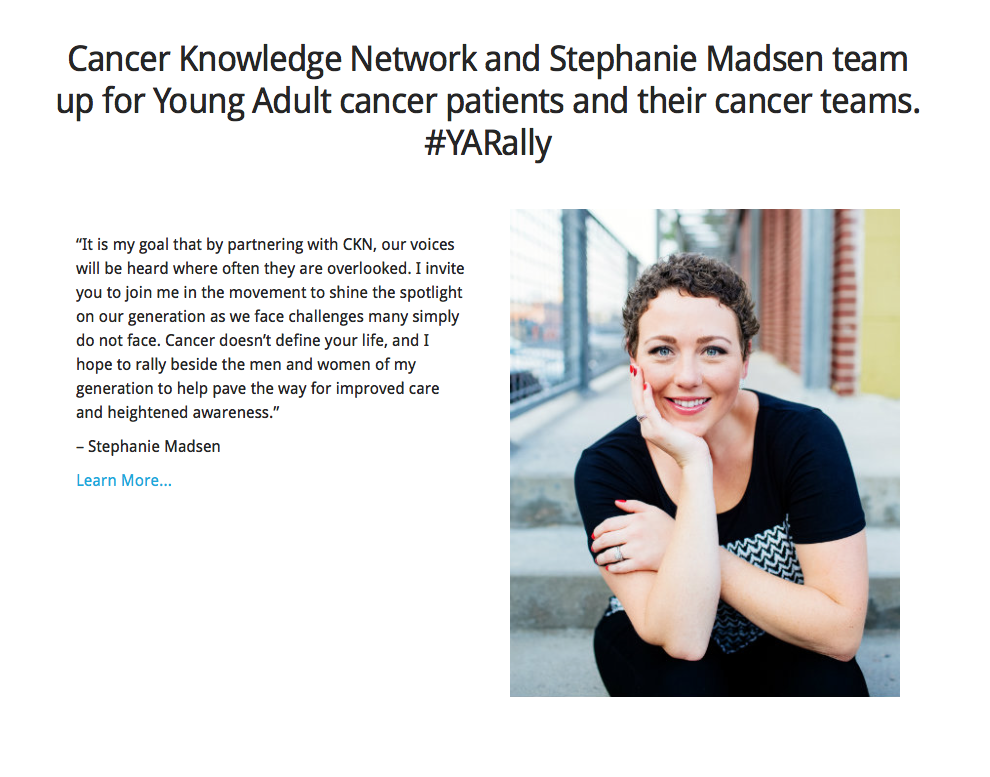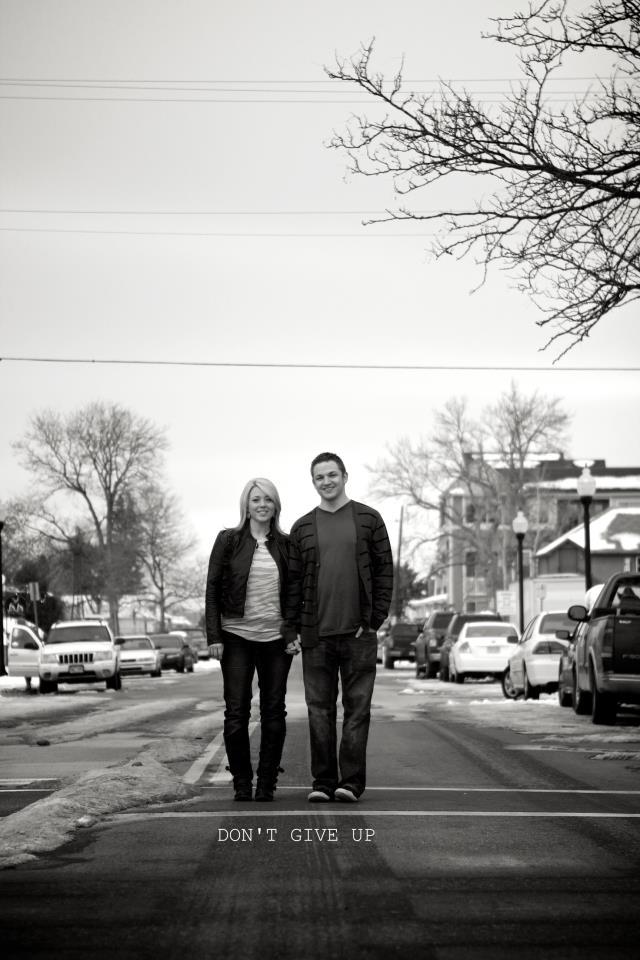
(As seen in Cancer Knowledge Network’s #YARally)
“I’m sorry to tell you, it’s cancer. You will need an emergency hysterectomy followed by chemotherapy and radiation.” With one fell swoop, my life, dreams, and plans dramatically changed. Not only did I learn that I had cancer, but also that my chances of bearing children were erased.
Prior to my diagnosis, my husband and I spoke frequently about having children. We dreamt about how many we would have and what their names would be. We laughed at who they would take after. Would they be fiercely independent (and stubborn) like their mom or gentle and patient like their dad? Would they have Matt’s tan complexion and my blue eyes? We noticed every pregnant woman passing by and couldn’t even walk through Target without perusing the baby section, dreaming of all the possibilities to come. Babies were destined to be in our future.
From a young age, we both felt called to be parents. Though we initially got married with the five-year plan in mind, after our first year of marriage, we were both struck with a bad case of baby fever. We no longer wanted to wait and were ready for a bundle of joy. However, no sooner could we begin the journey to pregnancy before a monstrous disease barged through the front door of our lives. Cancer began to fill every area of our perfectly prepared existence, quickly leaving no room for children.
Dreams began to disintegrate right before our eyes. No matter how tightly we clung to our hopes of bearing children, the dust of our wishes slipped between our fingers, disappearing into eternity.
We begrudgingly traded morning sickness for chemotherapy induced nausea. OB/GYNs for oncologists. Ultrasounds for PET scans. Mom bobs for bald heads. Baby showers for fundraisers. Dirty diapers for hospital bed catheters. Pint-sized outfits for hospital gowns. Pregnancy pains for surgery recovery. Labor and delivery for a radical hysterectomy. Motherhood for survival.
Shortly after my diagnosis and prior to my hysterectomy, we met with a fertility specialist. We learned about preserving fertility and what that could look like for us if we chose to walk that path. She versed us on the difference between surrogacy and gestational carriers, and taught us what an IVF journey looks like. We spoke about harvesting eggs, creating embryos, and freezing them for future use. We learned that not only could we adopt children, we could also adopt embryos. Our fertility doctor shared organizations that financially covered the cost of IVF for cancer patients. The immense knowledge that we learned in that first meeting not only gave us peace, comfort, and understanding, but also left us incredibly overwhelmed. How would we even begin to figure out what to do?
Because of the aggressive nature of my type of cancer, we were given a short amount of time to decide which route we would take. In fact, in our case, we had one hour to make the most life-impacting decisions one can make. Diagnosed on a Wednesday, by Friday we needed to have a game plan. The reason our decision needed to be made so quickly was due in part to the fact that the following Monday I would either be going into surgery, or beginning the four week process of harvesting my eggs. The single most terrifying and stressful moment thus far has been figuring out what path to walk.
Would we move forward with our fertility specialist and begin the process of harvesting my eggs in order to create embryos that someday would become our biological children, or would we choose surgery with my oncologist, saving my life but reducing the chances of creating a biological family? Ultimately, after endless tears, prayers of desperation, and emotional pain, my husband and I reached a conclusion. The priority was my life, and regardless of if our children were biological or adopted, they would need a healthy mother. The following week I underwent a radical hysterectomy.
They say hindsight is always 20/20 and I agree. After further testing of my tumor, we learned that my diagnosis was much more critical than we initially thought. I was given less than a 20% chance of surviving the first year. The type of cancer I was fighting was hormonal and in order to harvest eggs, I would have needed to be on daily hormone injections. We cringe at the thought of what might have happened had we chosen that path. I would likely not be here today.
The reality is, every young adult with cancer faces a multitude of decisions including matters of fertility. Many are fortunate enough to have doctors inform us of our choices before making final decisions that may inhibit fertility in the future. However, too often young adults are not made aware of the finality some treatments may cause for their dreams of having biological children once they enter remission. A cancer diagnosis brings fear, and many treatment plans are decided under pressure and fear of survival without consideration of the lifelong ramifications of rushed decisions. Before making treatment decisions, young adults need to feel comfortable with the full scope of what life during treatment and life after cancer will look like with each option.
Each diagnosis is different than the next. Therefore, each treatment journey looks different as well. Depending on what type of cancer, the location of the malignancy, staging, and necessary treatment, preserving fertility should be dealt with on a case-by-case basis. My decision may not be the same as yours, and that’s okay. Young adults should be aware of every option before reaching a conclusion for their fertility. Not only is there IVF, harvesting and preserving embryos, but should the route of forgoing chances of a biological family be chosen (or required), one must know that that does not close the door on hopes of a future family. There are several options for family planning, and the choices continue to expand in number as our advances in the medical community continue to grow.
My husband and I have always wanted to adopt, and once we grieved the loss of a biological family, we knew that my diagnosis was affirmation of that path. However, we feared that due to my medical history, we would be disqualified from adoption. I’ve lost my ability to conceive and carry a child, would I now lose the ability to even adopt one? After further investigation and a handful of helpful adoption advocates and agencies, we have learned that my diagnosis will not affect our chances of adopting. In fact, though we are only in the beginning stages of our adoption journey, we have seen several friends, who are young adult cancer survivors, with beautiful, successful adoption stories.
Though a young adult may not be ready for children yet, they should be well informed of their options before making crucial decisions. This is where our oncologists, fertility specialists, and advocates play a significant role. A cancer diagnosis can be emotionally paralyzing — a fog that causes decision making to feel impossible. Medical professionals have an important duty to walk alongside us, advocating for our future. It is imperative that oncologists and fertility specialists view our fertility and family planning as if it were their own.
Most young adults are unaware of the multitude of family planning options that exist in the medical community, but with the help of caring doctors, finding fertility can be a much less daunting task. There is hope for finding fertility and family planning as a young adult diagnosed with cancer.
Jeremiah 29:11 (ESV)
“For I know the plans I have for you, declares the Lord, plans for welfare and not for evil, to give you a future and a hope.”




